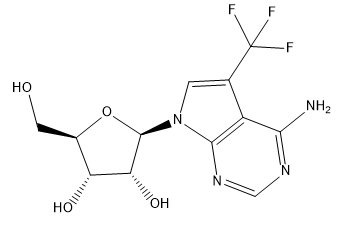Trifluoromethyl-tubercidin

Trifluoromethyl-tubercidin structure
|
Common Name | Trifluoromethyl-tubercidin | ||
|---|---|---|---|---|
| CAS Number | 1854086-05-7 | Molecular Weight | 334.25 | |
| Density | N/A | Boiling Point | N/A | |
| Molecular Formula | C12H13F3N4O4 | Melting Point | N/A | |
| MSDS | N/A | Flash Point | N/A | |
Use of Trifluoromethyl-tubercidinTrifluoromethyl-tubercidin (TFMT) inhibits host MTr1 and suppresses virus replication. TFMT inhibits MTr1 through interaction at its S-adenosyl-l-methionine binding pocket to restrict influenza virus replication. TFMT was effective in inhibiting viral replication in mice, displayed little toxicity. |
| Name | Trifluoromethyl-tubercidin |
|---|
| Description | Trifluoromethyl-tubercidin (TFMT) inhibits host MTr1 and suppresses virus replication. TFMT inhibits MTr1 through interaction at its S-adenosyl-l-methionine binding pocket to restrict influenza virus replication. TFMT was effective in inhibiting viral replication in mice, displayed little toxicity. |
|---|---|
| In Vitro | The median inhibitory concentration (IC50) for trifluoromethyl-tubercidin against IAV infection was 0.30 μM, and no notable in vitro toxicity was observed in the range of effective concentrations, as measured with water-soluble tetrazolium (WST)–8 cell viability assay. Trifluoromethyl-tubercidin treatment also greatly inhibited IAV replication when administered 3 to 4 hours after infection. Trifluoromethyl-tubercidin showed inhibitory activity in the IAV-infected mouse cell line LA-4, albeit with lower potency (IC50 = 7.7 μM) than in human cells[1]. |
| In Vivo | Trifluoromethyl-tubercidin treatment at 2 days after infection with IAV. At this point, NP and PB2 mRNA levels were significantly reduced by trifluoromethyl-tubercidin treatment in mouse lungs, indicating that the trifluoromethyl substitution of tubercidin reduces in vivo toxicity to levels we could not detect, but retains anti-IAV efficacy[1]. |
| References | 1. Tsukamoto Y, et al. Inhibition of cellular RNA methyltransferase abrogates influenza virus capping and replication. Science. 2023 Feb 10;379(6632):586-591. |
| Molecular Formula | C12H13F3N4O4 |
|---|---|
| Molecular Weight | 334.25 |